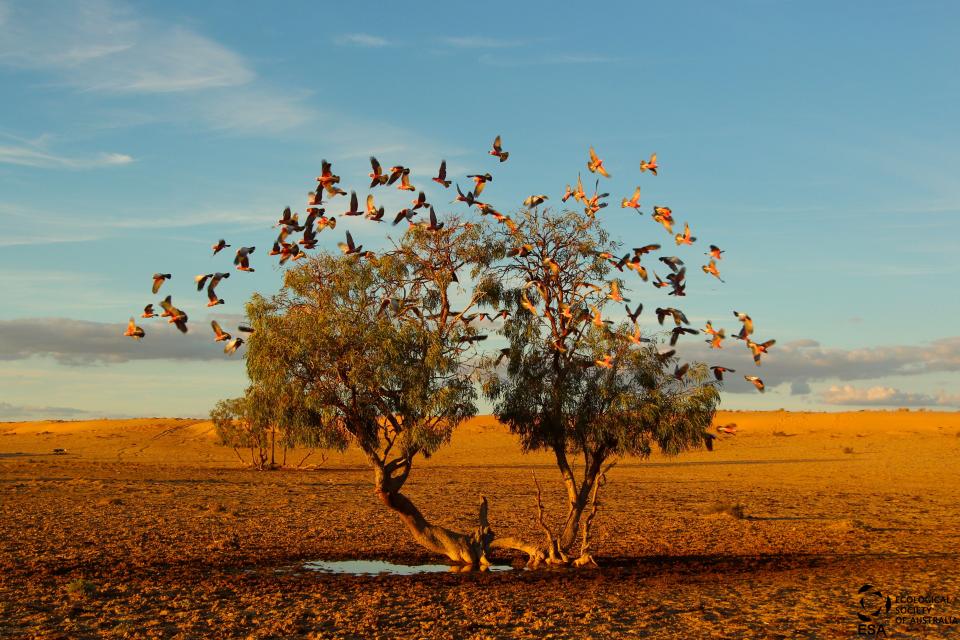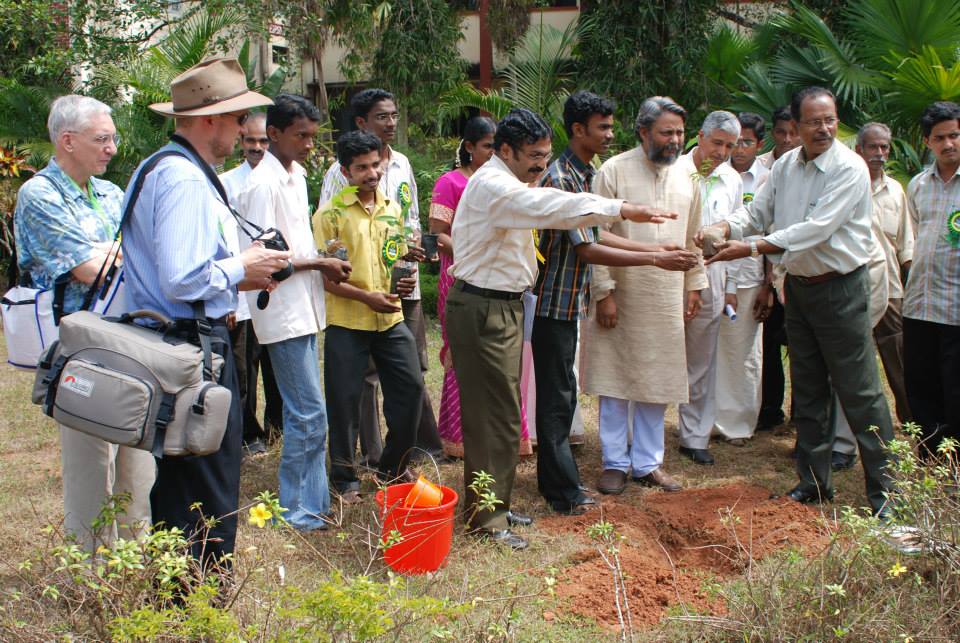I became an environmentalist with a Christian Concern

I started my career as a lecturer in Chemistry at Bishop Moore College, Mavelikara affiliated to the University of Kerala. My attitude and approach to Chemistry took a new turn when I visited Minamata in Japan in 1989. There I saw people suffering from Minamata diseases and heard the sad story of their struggle for life. They were the victims of organic mercury poisoning. People with Minamata diseases are still living in Minamata rehabilitation centre as living martyrs. With tears only we can hear it when the mothers of Minamata victims explain the sad fate of their children. The Cadmium thrown out of a factory as a waste into Jintsu river in Japan entered the food chain and became harmful to the people and the disease is known as Itai Itai disease. The Bhopal gas tragedy and the recent Endosulphan disaster in India were also due to chemical poisoning. It is not at all wrong if anybody comments that the harm the chemicals are doing to the environment is more severe than anything else. This was an eye-opener to me. Ecology had been a topic closely related to the Botanists and Zoologists. From the exposures I had, I am convinced that only a person having a chemistry background can interpret and interfere effectively to save Nature. I was really encouraged to read, study and do research on environmental issues. For a systematic study I enrolled as a research scholar in the University of Kerala and I got my doctorate for my thesis on river pollution. As a socially committed person, I started working as an environmental activist besides my teaching career and joined the Kerala Sastra Sahitya Parishad (People’s Science Forum). This organization is highly committed to people’s Movement. The Hindu religion dominant in India has a sound eco-theological background and the majority of Hindus in Kerala have a concern for the environment.
Click here to visit my Social Media Page!
Eastern Philosophies and Hindu religion
The Eastern view of the universe is ‘organic’ and ‘holistic’. This view is shared by practically by all Eastern philosophies/religion, such as the Hindu, Buddhist, Taoist, Shinto, or Zen. They believe in ultimate oneness of everything. They recognize that all forms are transitory. Human body is a medium to do penance. All these philosophies teach the followers to shun material pleasure as that is a hindrance in reaching the goal of liberation. Indian philosophical tradition culminated in an organic, holistic and spiritual world view and renunciative way of life. This philosophy places before us the goal of eternal bliss which can only be derived by reduction in wants. Hence, reduced consumption is an obvious outcome of it. There emerges, thus, a pattern which is eco-friendly and sustainable. The ‘Saffron thinking’ results in ‘Green living’, ‘Saffron’ signifies ‘Tyaga’, or renunciation. Bhoga, the tendency to consume more, gives rise to exploitation. Tyaga helps in nourishment. Bhoga results in possessiveness. Bhoga increases violence whereas Tyaga promotes peace. Possessiveness increases disparities; no possessiveness helps reduce disparities. Bhoga results in exploitation and pollution of Nature whereas Tyaga helps in conserving Nature.
 The Christian church in India is perceived as having little interest in environmental matters. It is quite shocking to note that the Christians are responsible for most of the ecological destructions. The attitude of most of the Christians is commercial. It is believed that Christianity came to India as a part of Trade and Business. For some Christians, man is the crown of creation. Hence there is a total disregard to the rights of other creations. This is quite evident in their life and attitude. How to challenge this attitude?. A member of that community can only do that. I have been excited by the wonderful Eastern philosophies. A fundamental change of attitude to the Earth – a deeply spiritual one –is necessary to address the problems we have created and to enhance our enjoyment of creation. It is necessary to inspire all people to know that caring for Creation is an essential part of the Christian faith.
The Christian church in India is perceived as having little interest in environmental matters. It is quite shocking to note that the Christians are responsible for most of the ecological destructions. The attitude of most of the Christians is commercial. It is believed that Christianity came to India as a part of Trade and Business. For some Christians, man is the crown of creation. Hence there is a total disregard to the rights of other creations. This is quite evident in their life and attitude. How to challenge this attitude?. A member of that community can only do that. I have been excited by the wonderful Eastern philosophies. A fundamental change of attitude to the Earth – a deeply spiritual one –is necessary to address the problems we have created and to enhance our enjoyment of creation. It is necessary to inspire all people to know that caring for Creation is an essential part of the Christian faith.
A common perception is that the Bible shows little concern for our relationship to Nature and perhaps even encourages its exploitation. This perception is often supported by reference to the biblical commands such as “subdue” the earth and “have dominion” over all living things (Genesis 1:28), which are interpreted to mean that human beings can treat the non-human world in whatever way they please. This interpretation and the perception that the Bible has little else to say about our relation to the earth have led many people reject the Bible as a resource for developing a sound environmental ethics.
Ecological concerns in Bible
Genesis 1-11 contains several fundamental ideas about the natural world and our place in it. For example, the opening verses of Genesis clearly state that God is the source of all life and that creation is good. Furthermore, the formation of Adam from “the dust of the ground” (Genesis 2:7) highlights the connection between human beings and the earth because Adam, the word for “human being,” is a play on adamah, the word for “ground” or “earth.” The story of Noah and the flood illustrates God’s concern for all creatures because it states that God made the covenant not just with human beings but with “every living thing” and that God desires all creatures to “be fruitful and multiply.” The ideas that God is the source of all life, that creation is good, that human beings are connected to the earth, and that God is concerned about all creatures strongly suggest that we are to value and respect the earth and its many forms of life. After the account of the great flood, the Bible stresses repeatedly that the covenant God makes is not just with Noah and his descendants, that is to say the humankind, but with “every living creature” As the worth of all living creatures is shown by their inclusion in the ark before the flood, so is their worth shown by their inclusion in the covenant after the water has receded. If we take seriously such an attitude of respect towards living creatures other than humans in the Noah narrative, then the story has profound implications for our current attitudes to animals and to biodiversity.

Several recent interpretations have shown that Genesis 1:28 and 2:15 call human beings to preserve and protect the Earth and its creatures. Many of the Psalms, such as Psalm 8, 104, and 148, reaffirm the goodness of creation and provide additional insights into our relation to Nature. Insights relevant to an understanding of our relation to the natural world are also found in Wisdom literature.It emphasizes the importance of nature as a medium of God’s revelation, for it presupposes that God’s wisdom can be revealed through observation of the natural world. At the same time, it points out the tremendous diversity and ultimate mystery of God’s creation. Other wisdom texts, such as God’s first speech from the whirlwind (Job 38, 39), indicate that God takes great delight in non-human creatures and did not create them for human benefit alone. Such passages all imply that human beings need to respect nature, to recognize the intrinsic value of its many creatures, to learn from it, and to preserve its incredible diversity.
Passages from letters of the New Testament, such as Romans 8:18-25, Colossians 1:15-23, 1 Corinthians 15:20-28, and Ephesians 1:10, indicate that Christ’s redemptive power affects the whole creation. The passage from Romans reveals that Paul had a universal vision of the “liberation of all the creatures of nature, along with human beings” through Christ’s death. Colossians 1:15-23 also claims that all things will be reconciled through Christ.
John 3:16 is probably the best known verse in the New Testament: “God so loved the World that he gave his only begotten son that whoever believes in him may not perish but have eternal life”. Have you noticed that the verse does not say: “God so loved humans …”, but “God so loved the world … ” – the whole cosmos? John proclaims that God’s love is not restricted to the human race; it extends to all aspects of life. Hence this well-known verse may be seen to contain considerable implications in relation to our attitudes to the environment.
All of the biblical passages that command us to love our neighbor also have strong implications to environmental responsibility, even if one does not extend the notion of “neighbour” to include non-human creatures, as some theologians have done. As we better understand the dimensions of our environmental problems, it is clear that they are often connected to social injustices. We cannot adequately show love to our neighbors, therefore, without taking into account the environmental problems that affect them.
The passages outlined above and many others provide very strong grounds for respecting nature and its creatures and for living in ways that preserve and protect them. Although certainly not all elements of the Bible depict our relation to the natural world in this way, the Bible clearly contains ample grounds for environmental responsibility. It provides valuable insights for building the foundations of an environmental ethic that, if lived out, can help solve today’s environmental problems.
These examples from the Bible give us slight idea of the biblical ecological heritage that we have, for so long, neglected. We believe it is time for the church to reclaim this heritage and make a useful contribution to the environmental debate.
We should recognise the riches of God’s creation and try to address from a Christian perspective the environmental problems of our society. Christian faith has a significant part to play in environmental debate and social action. We could affirm that all aspects of God’s Creation are linked and interdependent. Caring for God’s Creation is an expression of praise to the Creator.
What we do with God’s creation around us will have a tremendous effect, for good or ill, on the lives of our grandchildren and on the generations of their children and grandchildren. By our attitude to God’s creation now, we in fact determine the nature of the society that will be inherited later in the twenty-first century.
We see in nature a precious gift from God that we should cherish and respect, rather than something to subdue and exploit. God’s creation has value in itself, not just because it is useful to humans.
We hear the call of the Earth. The caring for life on Earth is a spiritual commitment.People and other species have the right to life unthreatened by human greed and destructiveness. Pollution, particularly from the energy-intensive wealthy industrialized countries, is warming the atmosphere. A warmer atmosphere is leading to major climate changes. The poor and vulnerable in the world and future generations will suffer the most. We commit ourselves to help reduce the threat of climate change through actions in our own lives, pressure on governments and industries, and standing in solidarity with those most affected by climate change. We provide the parishes with intellectual and spiritual resources designed to promote awareness of the links between the environment and Christian faith.
A Scriptural Basis for Eco-Management
Managing the Church’s facilities-buildings, grounds, and mobile transportation-from an ecological standpoint is grounded in God’s covenant with the whole world:
“I now establish my covenant with you and with your descendants after you and with every living creature that was with you- the birds, the livestock and all the wild animals, all those that came out of the ark with you-every living creature on earth….” And God said, “This is the sign of the covenant I am making between me and you and every living creature with you, a covenant for all generations to come: I have set my rainbow in the clouds, and it will be the sign of the covenant between me and the earth… Whenever the rainbow appears in the clouds, I will see it and remember the everlasting covenant between God and all living creatures of every kind on the earth.” (Genesis 9).
God keeps watch over the earth-all creation-and “all living creatures of every kind on the earth” because of this covenant of protection, surviving, and thriving. This watch is extended to the results of human creativity provided it resonates with the will of God. Our managing the facilities and grounds of the church in an environmentally responsible and friendly fashion is a part of the covenant between God and humans. God is clear about how important the creation and all the earth’s creatures are to Him. We are called to be equally clear about our commitment and covenant with the earth as central to our commitment and covenant with God.
“Unless the LORD builds the house, its builders labour in vain.
Unless the LORD guards the city, the guards keep watch in vain.” (Psalm 127:1).
Vision of the future
We know the kind of restructuring that is needed. In simplest terms, or fossil-fuel based, automobile-centered, throwaway economy is not viable model for the world. The alternative is a solar/hydrogen energy economy, an urban transport system that is centred on advanced – design public rail systems and a comprehensive reuse/recycle economy. The cities are to be designed for people and not for cars. We have to build an economy that will support, not undermine, future generations.
Conclusion
Like Moses and Elisha, we seek to be God’s agents of healing and restoration to those facing environmental crises as a result of ecological degradation.
We should affirm the rights of future generations.
- Right to a rich plant and animal world
- Right to healthy air and to an intact ozone layer
- Right to clean and sufficient water and, in particular, healthy and sufficient drinking water
- Right to healthy and fertile soil and to healthy woodland.
These are rights related to God’s creation that we now reaffirm since without these rights all other rights ultimately are lost. What’s the point of rights in society if the earth becomes unlivable?
Positions
Director and Convener of Ecological Department of CSI Synod, Chennai.
Director of Community Health Programme of CSI Church, Punnackadu.
Editor and Publisher of New Vision, Ecumenical Magazine.
Reasearch Guide in Environmental Chemistry, University of Kerala.
Former Principal, Bishop Moore College, Mavelikara.
Former Member of Pamba River Basin Authority (As a Subject Expert-nominated by the Govt. of Kerala – Chaired by the Chief Minister).
